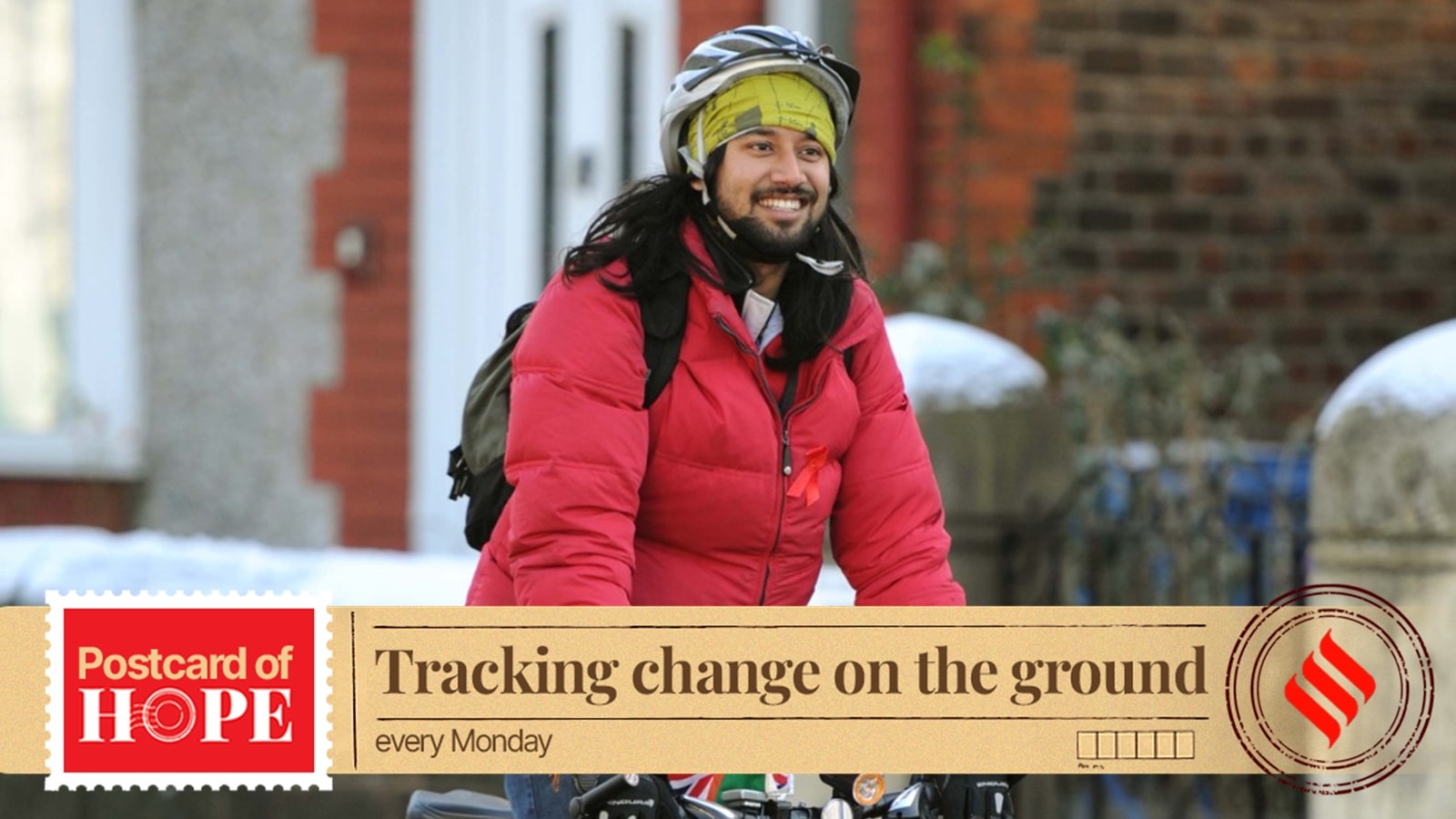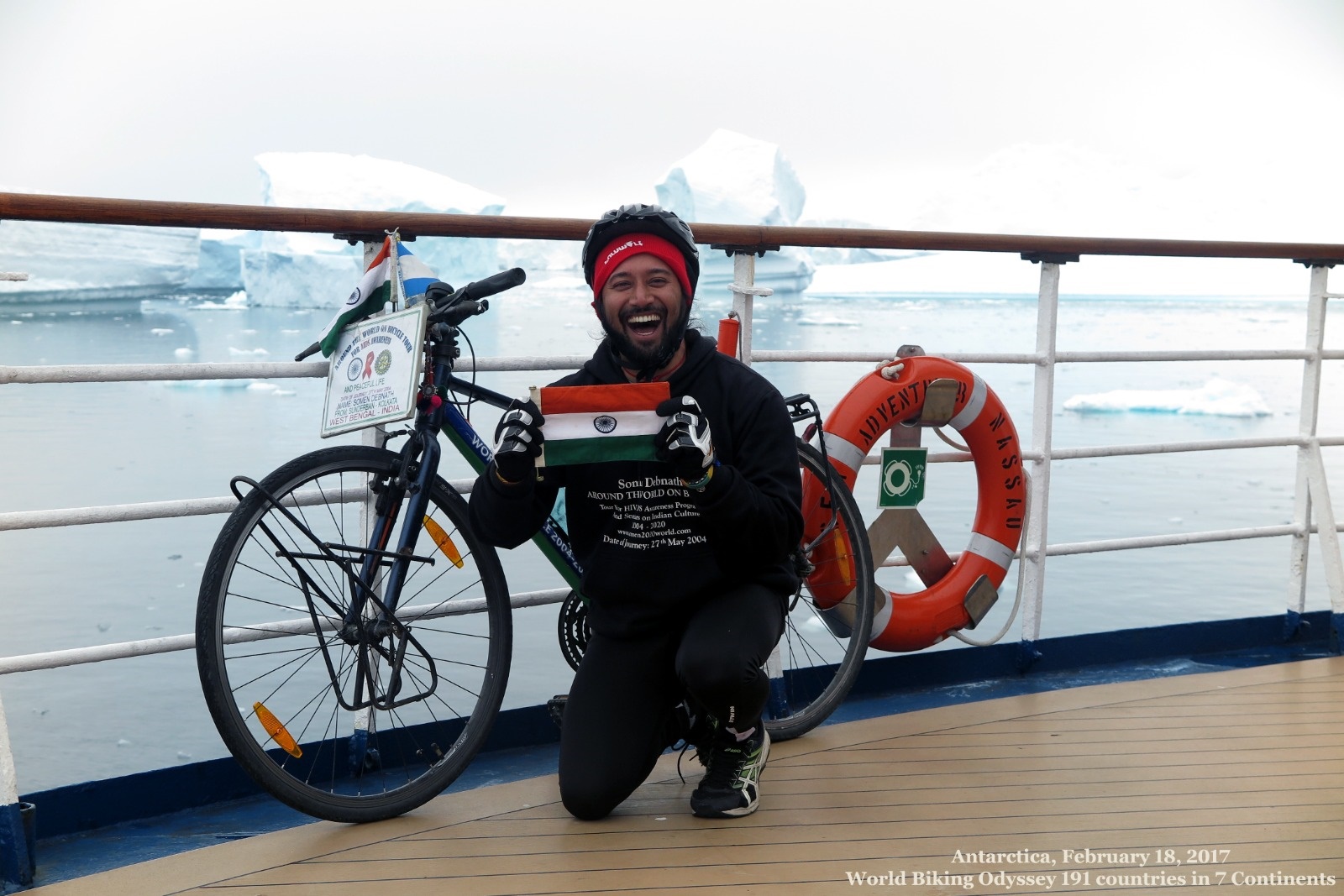He was captured by the Taliban while cycling from Kabul to Herat in 2007, he experienced the devastation of the tsunami in Sri Lanka in 2004, he pedalled on ice in Antarctica, and caught Covid in China in 2020. On December 17, 2023, Somen Debnath’s 19-year odyssey, during which he travelled to 191 countries, finally came full circle as he cycled his way back home to Basanti in the Sunderbans.
Soon, he will bring out his book, The World Biking Odyssey: 191 Countries, documenting his adventures.

He had started out aiming to create awareness about HIV/AIDS globally, which he did through lectures and interactions with underprivileged sections in urban, rural and tribal areas, as well as meeting students of schools, colleges, and universities worldwide.
“I would encourage institutions to start chapters on HIV/AIDS awareness programmes and promote the use of (fresh) needles and syringes among drug- addicts, and the use of condoms among sex workers. My aim has also been to spread awareness among the youth and encourage NGOs in different countries,” he says.
India, he found, was faring much better than many countries, with the National AIDS Control Organisation effectively deploying resources to have medicines reach affected people and conducting awareness programmes to reach vulnerable communities.
 At 14, he came across a newspaper article, headlined “AIDS is more deadly than cancer” and started raising awareness about the disease.
At 14, he came across a newspaper article, headlined “AIDS is more deadly than cancer” and started raising awareness about the disease.
The first step
Growing up in a large Bengali family, Debnath (40) was aware of the social norms by which a person’s life is structured around getting a job, getting married and having children. “I wanted to live a different life,” he says.
At 14, he came across a newspaper article, headlined “AIDS is more deadly than cancer”. He then started raising awareness about the disease at home and outside.
Story continues below this ad
“The second inspiration was Swami Vivekananda, who wrote in a book called Aamar Bharat Amar Bharat that if you want to see the world, see India, and when you go out into the world, you will find that in each corner of the world, there is an India. It came to my mind that when God gives me a chance, I would like to see India, the world, and how India exists in the world,” says Debnath.
His third inspiration was Bimal Mukherjee, the first Indian globe-trotter, who travelled the world on a cycle from 1926 to 1937 – without a passport since this was the colonial era – and documented the experiences in the book, Du Chakay Duniya.
On May 27, 2004, two days after graduating in Zoology from the University of Kolkata, Debnath set off on his own cycling expedition with Rs 422 and no sponsorship. He relied on donations and support for his travels in India.
Then, he received financial support from the Ministry of External Affairs, then headed by Pranab Mukherjee, and four other ministries. This amounted to Rs 50,000, a number of letters and visas. “That is a sort of contribution and support from the Central government, which went a little way. During my travels in different countries, I reached out to the Indian community as the main source of travel expenses,” he says.
Story continues below this ad
 Debnath has lived through the 2004 Assam floods, a 2018 tornado in Florida, and the 2019 Typhoon Hagibis in Japan.
Debnath has lived through the 2004 Assam floods, a 2018 tornado in Florida, and the 2019 Typhoon Hagibis in Japan.
The route
From 2004 to 2007, Debnah charted a route through India’s 28 states and five Union Territories, before heading out to 23 countries in Asia in the next two years, followed by 50 countries in Europe, and Greenland, from 2009 and 2012. Next, he visited 52 countries in Africa and eight countries in the Middle East until 2015.
From 2015 to 2020, Debnath cycled through 48 countries in South and North America, and Antarctica. Then, in February 2020, just as Covid-19 was about to become a pandemic, he found himself in China and the virus found him. “Somehow, it was drinking boiled water that saved me, though I burnt my throat,” he says.
He took a plane from China to South Korea, and eventually ended up spending the lockdown in New Zealand. “The lockdown was quite hard, but I considered the fact that the whole world was more miserable than me,” he says. It was 2022 before he could travel again, and visited Australia, Oceania and Southeast Asia before re-entering India.
The pandemic was just one of the many challenges that peppered his path. Debnath has lived through the 2004 Assam floods, a 2018 tornado in Florida, and the 2019 Typhoon Hagibis in Japan. He has been beaten up and even got lost in the Amazon. One of his near-death experiences was in Afghanistan, when he was stopped by four men with guns in a car, and at least one of them wanted to kill him because they thought he was an Indian Army soldier, he says. “I was thinking that I need to speak. Otherwise, they will kill me. I understood only their body language, not their words. I told them that I was not in the Indian Army. I was travelling around the world, meeting people under pressure,” he says.
Story continues below this ad
He was blindfolded, taken “I don’t know where”, and beaten for four days until a translator arrived who could speak English. Debnath was asked about the Quran that he always carried in his bag, and his opinion of Islam and the Taliban. The experience ended with his being their prisoner, during which he offered to cook for them “because their food was not delicious”.
“One day, I made them lunch and they liked it. Thereafter, I made many spicy curries that I had learned from my mother and my Mejo Ma (second uncle’s wife). I cooked different kinds of pakodas, biryani and many curries,” he says. After 24 days of captivity, he was blindfolded and left 16 km from the Iraq border.
 The journey has also changed him, making him “think positive and be optimistic” in his way of life.
The journey has also changed him, making him “think positive and be optimistic” in his way of life.
Back Home
On his journeys, Debnath would sometimes be joined by others on their cycles for distances between 20 and 500 km, “Because people wanted to be part of my journey. But I was always alone. I never felt lonely because I think that life is a journey and made up of duty, duty and duty – duty to yourself, duty to others and duty to your God,” he says.
Three of his cycles have been stolen, five he sent back home, and it was on his ninth cycle that Debnath arrived home. “It is not the make of the cycle that is important, it is your mindset. You can go with a simple cycle and start your journey. What matters is how long you want to continue your journey,” he says.
Story continues below this ad
Debnath is back to a very different landscape. His brothers are married and have their families, as do his uncles. “We are still a close family but people are living separately in the village,” he says. The journey has also changed him, making him “think positive and be optimistic” in his way of life.
“Though many things have changed in my home and the village, I am quite comfortable because life is about changing and I accept the knowledge,” he says. He is working on his book, which will take a year, as well as a show of the paintings he made on his travels.



 At 14, he came across a newspaper article, headlined “AIDS is more deadly than cancer” and started raising awareness about the disease.
At 14, he came across a newspaper article, headlined “AIDS is more deadly than cancer” and started raising awareness about the disease. Debnath has lived through the 2004 Assam floods, a 2018 tornado in Florida, and the 2019 Typhoon Hagibis in Japan.
Debnath has lived through the 2004 Assam floods, a 2018 tornado in Florida, and the 2019 Typhoon Hagibis in Japan. The journey has also changed him, making him “think positive and be optimistic” in his way of life.
The journey has also changed him, making him “think positive and be optimistic” in his way of life.





